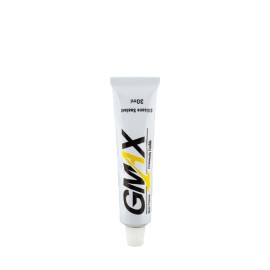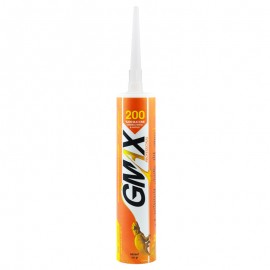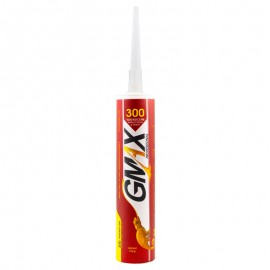

Silicone gmax 170
**GMAX Silicone Adhesive: The Ideal Choice for Sealing and Bonding**
GMAX silicone adhesive, commonly referred to as aquarium glue, is a high-performance liquid adhesive primarily used for sealing applications. This advanced adhesive is manufactured through a polymerization process using a combination of organic materials. The core components of GMAX silicone adhesive are silicon and oxygen, providing exceptional resistance to temperature fluctuations and moisture penetration. These elements also contribute to the adhesive's robust molecular structure, ensuring superior strength and durability.
Thanks to its unique properties, GMAX silicone adhesive offers enhanced stability and can be used to bond a wide range of surfaces. Packaged conveniently in pressure tubes, it is easy to apply for both professionals and DIY enthusiasts. Its water-resistant, moisture-resistant, and heat-resistant properties make it ideal for demanding applications. Originally developed for aquarium construction, this versatile adhesive has now become a go-to solution for various sealing needs, including building glass installation, sink and toilet mounting, tile edge bonding, and more.
Choose GMAX silicone adhesive for a reliable and long-lasting bond that can withstand challenging environmental conditions.
technical specifications
|
Density |
0.97 g/ml |
|
Temperature Resistance |
Between -50 to 250 c |
|
Vulcanization Speed |
15-20 minutes |
|
Curing Speed |
1.5 mm/day |
|
Losing Volume |
5.5% (DIN 52451) |
|
Shore a Hardness |
20 (ISO 868) |
|
Steady Elasticity |
25% (DIN 52451) |
|
Elongation at Break |
400% |
|
Power of Breaking Potential |
2.3 MPa |
|
Maximum Joint Measures |
30 mm |
|
Heat Insulation Quality |
0.17 w/km (DIN 53612) |
|
Elasticity |
200% (ISO 8339) |
|
NCT WT |
250 gr |
|
colors |
White- black- transparent |
https://hypergmax.com/silicone-glue/
product usage
**Silicone 170 GMAX: Versatile Adhesive for Multiple Industries**
Silicone 170 GMAX adhesive is a widely used tool in both industrial and household applications due to its exceptional properties, such as resistance to high temperatures, humidity, and harsh environmental conditions. This makes it an ideal choice for a variety of uses across multiple sectors.
Applications in the Construction Industry
Silicone 170 GMAX is commonly used for sealing joints between tiles, glass, sinks, and other surfaces. Its superior bonding strength and resistance to moisture make it the preferred adhesive for construction and renovation projects, ensuring long-lasting results.
Automotive Industry Uses
In the automotive industry, Silicone 170 GMAX is relied upon for sealing and bonding engine parts and brake systems. Its high temperature resistance, as well as its durability against oil and chemicals, makes it a reliable choice for demanding automotive applications.
Electronics Industry Protection
Silicone 170 GMAX adhesive plays a crucial role in protecting electronic components from moisture and dust, which helps in maintaining the integrity and performance of sensitive electronics. Its application extends to coating and insulating electronic parts to safeguard them from environmental damage.
Medical Industry Compatibility
In the medical field, Silicone 170 GMAX is used to manufacture prosthetics and medical equipment due to its non-toxic nature and biocompatibility with the human body. This makes it a trusted adhesive for critical applications where safety is paramount.
Household and DIY Applications
Beyond industrial uses, Silicone 170 GMAX is also ideal for household repairs, such as sealing windows and doors, fixing appliances, and even in arts and crafts projects. Its versatility and ease of use make it a staple tool for both professionals and DIY enthusiasts.
Overall, Silicone 170 GMAX stands out as a reliable, high-quality adhesive with diverse applications, making it an essential product in various industries and daily life scenarios. Choose Silicone 170 GMAX for a dependable and effective bonding solution tailored to your specific needs.
how to maintain
Silicone 170 GMAX maintenance
Keep away from moisture and on a wooden pallet with a maximum of 6 cartons in height.
Store at -10 to +50 degrees Celsius.
How to use
How to use Silicone 170 GMAX
-
Before proceeding to the injection of glue, it is necessary to thoroughly clean the desired surfaces. In case of sealing, the glass should be cleaned well and free of any dust.
-
At this stage, it is necessary to charge the glue into the barrel with the help of a cartridge or special tools and prepare the work preparations.
-
Now bring the tip of the gun barrel or cartridge closer to the desired surface, gently inject the glue on the surface. Try to inject the glue on a smooth line.
-
After injection, to make the glass look clean, after injection, the glue should be smoothed with a cutter or other tool.
Methods for removing aquarium glue from surfaces
- If silicone glue has been spilled on your hands or work clothes, you can wipe it off the surface with a cloth or nylon before the glue dries. Nylon is easier to use in such cases. After removing the glue, you can use warm water and detergent to prevent the effect.
- In cases where you use glue for sealing and some of it exceeds the specified limit, you can use nylon or a cloth to clean the surfaces.
- If the glue dries, if it is possible to remove the glue with a spatula, you can get help from a spatula. To eliminate its effect, if it is on the fabric, you should use a strong detergent.
- If it is not possible to remove the glue with a spatula, you can use solvents such as acetone or vinegar.
- In some cases, by heating the glue with the help of a hairdryer, its texture will be softer and can be separated.




